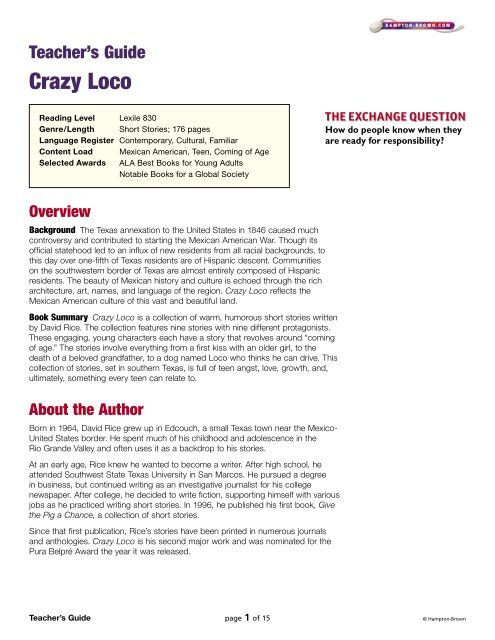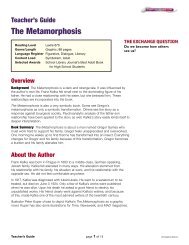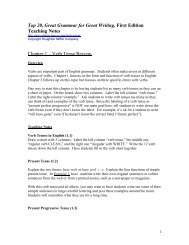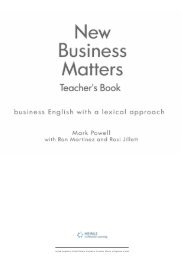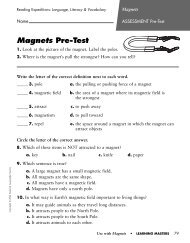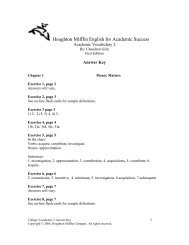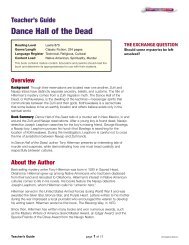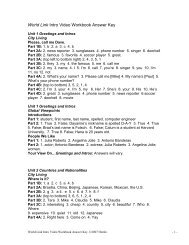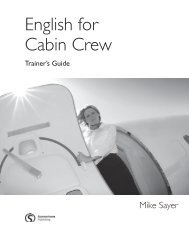Crazy Loco
Crazy Loco
Crazy Loco
Create successful ePaper yourself
Turn your PDF publications into a flip-book with our unique Google optimized e-Paper software.
Teacher’s Guide<br />
<strong>Crazy</strong> <strong>Loco</strong><br />
Reading Level Lexile 830<br />
Genre/Length Short Stories; 176 pages<br />
Language Register Contemporary, Cultural, Familiar<br />
Content Load Mexican American, Teen, Coming of Age<br />
Selected Awards ALA Best Books for Young Adults<br />
Notable Books for a Global Society<br />
Overview<br />
Background The Texas annexation to the United States in 1846 caused much<br />
controversy and contributed to starting the Mexican American War. Though its<br />
official statehood led to an influx of new residents from all racial backgrounds, to<br />
this day over one-fifth of Texas residents are of Hispanic descent. Communities<br />
on the southwestern border of Texas are almost entirely composed of Hispanic<br />
residents. The beauty of Mexican history and culture is echoed through the rich<br />
architecture, art, names, and language of the region. <strong>Crazy</strong> <strong>Loco</strong> reflects the<br />
Mexican American culture of this vast and beautiful land.<br />
Book Summary <strong>Crazy</strong> <strong>Loco</strong> is a collection of warm, humorous short stories written<br />
by David Rice. The collection features nine stories with nine different protagonists.<br />
These engaging, young characters each have a story that revolves around “coming<br />
of age.” The stories involve everything from a first kiss with an older girl, to the<br />
death of a beloved grandfather, to a dog named <strong>Loco</strong> who thinks he can drive. This<br />
collection of stories, set in southern Texas, is full of teen angst, love, growth, and,<br />
ultimately, something every teen can relate to.<br />
About the Author<br />
Born in 1964, David Rice grew up in Edcouch, a small Texas town near the Mexico-<br />
United States border. He spent much of his childhood and adolescence in the<br />
Rio Grande Valley and often uses it as a backdrop to his stories.<br />
At an early age, Rice knew he wanted to become a writer. After high school, he<br />
attended Southwest State Texas University in San Marcos. He pursued a degree<br />
in business, but continued writing as an investigative journalist for his college<br />
newspaper. After college, he decided to write fiction, supporting himself with various<br />
jobs as he practiced writing short stories. In 1996, he published his first book, Give<br />
the Pig a Chance, a collection of short stories.<br />
Since that first publication, Rice’s stories have been printed in numerous journals<br />
and anthologies. <strong>Crazy</strong> <strong>Loco</strong> is his second major work and was nominated for the<br />
Pura Belpré Award the year it was released.<br />
THE EXCHANGE QUESTION<br />
How do people know when they<br />
are ready for responsibility?<br />
Teacher’s Guide page 1 of 15 © Hampton-Brown
<strong>Crazy</strong> <strong>Loco</strong><br />
Reading the Book<br />
There are several options for reading <strong>Crazy</strong> <strong>Loco</strong>. They include:<br />
Whole Class Assign sections of the book and discussion dates<br />
using the planner on Student Journal, page 1. After students<br />
read a section and respond to the corresponding Student<br />
Journal pages, have a class discussion. At the end of the book,<br />
the class meets for The Exchange.<br />
Small Groups Read the book’s Introduction with the group.<br />
Group members then read an agreed-upon number of pages,<br />
complete the corresponding Student Journal pages, and meet<br />
to discuss. When they finish the book, they meet again for The<br />
Exchange. Use the planner on Student Journal, page 1 to<br />
establish meeting times.<br />
Independently Students read the book on their own and<br />
then meet as a group for The Exchange. Use the planner on<br />
Student Journal, page 1 to establish the meeting time.<br />
Guided Reading Have students read Student Journal,<br />
page 2 and monitor their discussion of the What If? scenario.<br />
Read aloud the book’s Introduction to give students background<br />
on the book. As students read, use the Before You Move On<br />
questions to guide comprehension. Use the Look Ahead to set<br />
a focus for reading the next set of pages. At the end of each<br />
section, assign the appropriate Student Journal pages.<br />
Discuss the pages before starting the next section. Establish a<br />
date for The Exchange and record it on the planner.<br />
Getting Started<br />
Have students read What If? on Student Journal, page 2<br />
and discuss the scenario. Encourage students to describe the<br />
similarities and differences between the scenario and their lives and<br />
imagine how the situation would affect them.<br />
Have students write their responses to the three questions below<br />
the scenario and compare answers with a partner or the group.<br />
Have students discuss how the situation might relate to The<br />
Exchange question and then write a brief summary of their<br />
discussion in the Student Journal.<br />
Student Journal<br />
<strong>Crazy</strong> <strong>Loco</strong><br />
by David Rice<br />
Reading Schedule<br />
Student Journal, page 1<br />
Teacher’s Guide page 2 of 15 © Hampton-Brown<br />
Name:<br />
Group members: _____________________________________________________________<br />
_____________________________________________________________________________<br />
<strong>Crazy</strong> <strong>Loco</strong> Student Journal Due Date Discussion Date<br />
Introduction Pages 2–4<br />
Pages 13–46 Pages 5–6<br />
Pages 47–79 Pages 7–8<br />
Pages 80–104 Pages 9–10<br />
Pages 105–141 Pages 11–12<br />
Pages 142–175<br />
The Exchange<br />
Assessment<br />
Pages 13–14<br />
Getting Started<br />
What If?<br />
How do people<br />
know when they<br />
are ready for<br />
responsibility?<br />
Student Journal, page 2<br />
You just got your driver’s license. You are so excited to be able to drive,<br />
but you do not have the money to buy yourself a car. Your parents agree<br />
to let you drive their car as long as you agree to help them with some<br />
errands.<br />
The next week, your aunt has an emergency. Your parents are at work<br />
and ask you to pick up your four-month-old niece from her daycare<br />
center and bring her to your house. You have the car seat, but you do<br />
not know how to put it in the car. You are not sure what to do if your<br />
niece cries or how to change a diaper. And, you are not confident in<br />
your new driving skills.<br />
Make notes about how this would affect you.<br />
Would you feel ready for this responsibility?<br />
Would you agree to help with this errand? Why or why not?<br />
What could you do to better prepare yourself for this errand?<br />
Connect to The Exchange Question Discuss how this situation<br />
could relate to The Exchange Question: How do people know when<br />
they are ready for responsibility? Summarize your discussion.<br />
<strong>Crazy</strong> <strong>Loco</strong>
<strong>Crazy</strong> <strong>Loco</strong><br />
Introduction<br />
Have students read the book’s Introduction. Check their<br />
comprehension with the three follow-up questions on Student<br />
Journal, page 3.<br />
Introduction: Key Concepts<br />
Have students study the first Key Concept with the help of the<br />
graphic organizer on Student Journal, page 4. After studying the<br />
example, they should create similar graphic organizers to focus<br />
their understanding of the three remaining Key Concepts.<br />
Introduction<br />
Student Journal, page 3<br />
Read the Introduction on pages 9–11 in <strong>Crazy</strong> <strong>Loco</strong>. The Introduction will<br />
help you understand key concepts in the book. Knowing them will help<br />
you discuss and write about the book.<br />
The Introduction includes information about<br />
what a short story is<br />
how teens can relate to the stories<br />
when David Rice decided to become an author<br />
After you read the Introduction, answer these questions to check your<br />
understanding.<br />
1. What is a short story? How is it similar to and different from a novel?<br />
2. How can teenagers relate to the stories in this collection?<br />
3. When did David Rice know he wanted to be an author?<br />
Teacher’s Guide page 3 of 15 © Hampton-Brown<br />
<strong>Crazy</strong> <strong>Loco</strong><br />
A short story is a work of fiction that is shorter than a<br />
novel. A short story can be one page or more than fifty<br />
pages long. Like a novel, a short story has its own setting,<br />
characters, and plot.<br />
Teenagers can relate to the common experiences and<br />
struggles that the teenage characters face as they grow up.<br />
Rice knew at a young age that he wanted to be an author.<br />
He became a professional writer when he was twenty-seven<br />
years old.<br />
Introduction: Key Concepts<br />
Personal Experience Chart<br />
Study the Personal Experience Chart for emotion. Write about a<br />
personal connection using the word emotion.<br />
Personal Experience Chart<br />
Key Concept: _______________________________________________________<br />
emotion<br />
Define or rename: ______________________________________________________<br />
a strong feeling<br />
Specific Examples<br />
My mom could not<br />
hide her emotions<br />
when our dog died.<br />
She cried all day.<br />
Personal Connection: ___________________________________________________<br />
_________________________________________________________________________<br />
On a separate sheet of paper, create a similar Personal Experience<br />
Chart for community, maturity, and respectful.<br />
Student Journal, page 4<br />
At the Memorial Day<br />
parade, people showed<br />
different emotions.<br />
Most people were<br />
proud but sorrowful.<br />
<strong>Crazy</strong> <strong>Loco</strong><br />
Key Concepts<br />
collection<br />
community<br />
emotion<br />
maturity<br />
respectful<br />
Our drama class<br />
instructor taught us<br />
how to express different<br />
emotions through<br />
gestures.
<strong>Crazy</strong> <strong>Loco</strong><br />
Pages 13–46 Answers for Before You Move On<br />
Pages 13 – 46<br />
PAGE 28<br />
1. Narrator Who is the narrator? What does he want?<br />
Romero is the narrator. He wants to date an older girl.<br />
2. Character Romero does not get Veronica to be his<br />
girlfriend, but he seems happy at the end of the story. Why?<br />
Romero got to kiss Annette on the hayride.<br />
PAGE 46<br />
1. Sequence What events occur that lead to Tommy meeting<br />
Catalina’s sons?<br />
Tommy’s parents sell their house, so Catalina doesn’t work<br />
for them anymore. Then Catalina’s grandson dies, so Tommy<br />
goes to the funeral.<br />
2. Cause and Effect Reread pages 42–45. What causes<br />
Tommy’s opinion of Emiliano and Guillermo to change?<br />
Tommy didn’t know much about them before visiting their<br />
home. Now he cares about them because he realizes how<br />
much they care about him.<br />
Respond to Pages 13–46<br />
Student Journal, page 5<br />
1. Personal Response The school in “Sugarcane Fire” holds special<br />
events for high school students, such as dances and a hayride. What<br />
events does your school have? Which do you enjoy the most? Why?<br />
2. Cause and Effect In “Her Other Son,” how does Tommy experience<br />
maturity when he visits Catalina’s family in Mexico? Use the word<br />
maturity in your response.<br />
3. Irony In “Sugarcane Fire,” what is ironic about Romero and Annette’s<br />
relationship?<br />
4. Generate Questions Write a question about this section for someone<br />
else reading this book. Exchange questions with them. Do you agree<br />
with their answer?<br />
Teacher’s Guide page 4 of 15 © Hampton-Brown<br />
<strong>Crazy</strong> <strong>Loco</strong><br />
Tommy realizes for the first time how much his family<br />
means to Catalina and her family. Tommy feels guilty<br />
because Catalina has made him part of her family, but<br />
Tommy doesn’t know anything about Catalina’s family.<br />
This reaction shows that Tommy has a growing maturity.<br />
It is ironic that Annette is attracted to Romero because<br />
Romero likes Annette’s sister Verónica. Romero thinks<br />
Verónica would never notice him because she is a year<br />
older than he is. It is ironic that Annette flirts with Romero<br />
because she is even older than Verónica is.<br />
Respond to Pages 13– 46, continued<br />
5. Comparisons In “Her Other Son,” Tommy remembers crossing the<br />
border when he was young. At the end of the story, he crosses the<br />
border again. Write his feelings and actions during these crossings.<br />
T Chart<br />
Student Journal, page 6<br />
Tommy’s First Crossing Tommy’s Second Crossing<br />
is afraid of crossing the<br />
border<br />
is nervous to answer the<br />
agent<br />
does not answer because he<br />
is afraid<br />
<strong>Crazy</strong> <strong>Loco</strong><br />
Compare Tommy’s border crossings. Why is Tommy’s second border<br />
crossing so different from his first?<br />
___________________________________________________________________________________<br />
When Tommy is young, he is too nervous to answer. He is<br />
___________________________________________________________________________________<br />
afraid of authority and is willing to do as he is told. As he<br />
___________________________________________________________________________________<br />
gets older, he realizes that life is unfair, especially Catalina’s<br />
___________________________________________________________________________________<br />
life ___________________________________________________________________________________<br />
in Mexico. At his second border crossing, his awareness<br />
of ___________________________________________________________________________________<br />
the problems in the world affect him. He does not<br />
answer the agent out of defiance.<br />
is distracted by thoughts<br />
about Catalina<br />
is not afraid or nervous<br />
about the agent<br />
does not answer because<br />
he is conflicted
<strong>Crazy</strong> <strong>Loco</strong><br />
Pages 47–79 Answers for Before You Move On<br />
Pages 47 – 79<br />
PAGE 58<br />
1. Cause and Effect Luis tells the teacher that Bobby and<br />
Marco lifted Nina’s skirt. How does this affect him through<br />
the rest of his schooling?<br />
Luis has a hard time making friends. The boys bully him<br />
through high school. Nina is never nice to him again.<br />
2. Paraphrase On pages 54– 55, Luis says that loving<br />
someone hurts. What does he mean?<br />
Luis means that his love for Nina cost him a lot—eight years<br />
of getting bullied by Bobby and Marco.<br />
PAGE 79<br />
1. Comparisons On page 65, Harry thinks Papa Lalo is dead.<br />
On page 76, he is dead. How do Harry’s reactions change<br />
from the beginning to the end of the story?<br />
The first time Harry didn’t really care and didn’t want to<br />
touch Papa Lalo. The second time he was very upset and<br />
tried to save him.<br />
2. Character’s Motive Why do you think Harry burns his<br />
grandfather’s suit?<br />
Harry burns the suit as a way of dealing with his grandfather’s<br />
death and saying farewell.<br />
Respond to Pages 47–79<br />
1. Personal Response In “Valentine,” Luis remembers Valentine’s Day<br />
in his kindergarten class. What is a strong memory you have from<br />
when you first went to school? Why do you think this memory stays<br />
with you?<br />
2. Character’s Motive In “Papa Lalo,” Papa Lalo is respectful when he<br />
gives Harry his surveyor’s compass. What does this show you about<br />
Papa Lalo? Use the word respectful in your response.<br />
Student Journal, page 7<br />
3. Making Decisions In “Valentine,” Luis goes to a graduation party and<br />
talks about what happened when Bobby and Marco lifted Nina’s skirt. If<br />
you were Luis, would you have mentioned that incident? Why or why not?<br />
4. Generate Questions Write a question about this section for someone<br />
else reading this book. Exchange questions with them. Do you agree<br />
with their answer?<br />
Teacher’s Guide page 5 of 15 © Hampton-Brown<br />
<strong>Crazy</strong> <strong>Loco</strong><br />
Papa Lalo wants to give Harry something important to take<br />
with him on his camping trip. Giving Harry the compass is<br />
a loving, respectful gesture. This gift shows that Papa Lalo<br />
recognizes that Harry is growing up and would treasure the<br />
compass.<br />
Respond to pages 47–79, continued<br />
5. Cause and Effect In “Papa Lalo,” Harry and his family move in with<br />
Papa Lalo. List the effects this has on Harry in the Effects column.<br />
Use the Cause and Effect Chart to answer the question.<br />
Why do you think Harry and Papa Lalo have problems with their<br />
relationship? What causes the problems?<br />
Student Journal, page 8<br />
<strong>Crazy</strong> <strong>Loco</strong><br />
Cause and Effect Chart<br />
Causes Effects<br />
1. Harry’s mother tries to burn 1. Harry’s family moves<br />
down their home.<br />
to Papa Lalo’s.<br />
2. Harry’s room is the T V room. 2. Harry has to watch<br />
bad programs.<br />
3. Papa Lalo gives Harry a<br />
3. Harry begins to like<br />
compass.<br />
Papa Lalo.<br />
4. Papa Lalo kills Harry’s<br />
4. Harry is angry with<br />
rabbits.<br />
Papa Lalo.<br />
5. Harry is invited to a lot of 5. Papa Lalo gives Harry<br />
quinceañeras.<br />
money for them.<br />
6. Papa Lalo dies.<br />
6. Harry realizes how<br />
much he loves<br />
Papa Lalo.<br />
Harry causes problems because he does not like Papa<br />
Lalo’s TV programs and yells at him when Papa kills his<br />
rabbits. Papa Lalo causes problems because he kills<br />
Harry’s rabbits and is stubborn. They probably are not used<br />
to compromising for another person.
<strong>Crazy</strong> <strong>Loco</strong><br />
Pages 80–104 Answers for Before You Move On<br />
Pages 80 – 104<br />
PAGE 91<br />
1. Character Reread pages 80–82. How does <strong>Loco</strong> the dog<br />
get his name? Why is the name “<strong>Crazy</strong>” good for him?<br />
The family tries giving the dog many names, but he doesn’t<br />
respond. He responds to <strong>Loco</strong> when he tries to drive the<br />
car. <strong>Loco</strong> acts crazy—he jumps in the public pool, chases<br />
everything, and loves being in the car.<br />
2. Conclusions Why does Mom say she thinks <strong>Loco</strong> drove<br />
to California?<br />
<strong>Loco</strong> loved to pretend he was driving, and he loved their trip<br />
to California.<br />
PAGE 104<br />
1. Evidence and Conclusions Reread pages 92–93. Richard’s<br />
father is very patriotic. What evidence supports this conclusion?<br />
Richard’s father named his son after Richard Nixon. He was<br />
proud to serve in the U.S. Army and National Guard.<br />
2. Comparisons Reread page 102. Compare what Rosie<br />
and Dad say about America. What do each of them think it<br />
means to be American?<br />
Rosie thinks being Mexican American means being treated<br />
badly. Dad thinks being American means serving your<br />
country and being proud.<br />
Respond to Pages 80–104<br />
Student Journal, page 9<br />
1. Personal Response In “Proud to Be an American,” Richard’s father is<br />
proud of his country and of serving in the war. What story or event in<br />
your family’s history makes you proud?<br />
2. Conclusions In “<strong>Crazy</strong> <strong>Loco</strong>,” how does the family deal with their<br />
emotions when <strong>Loco</strong> disappears? Is this a good way to deal with loss?<br />
Why or why not? Use the word emotion in your response.<br />
3. Paraphrase In “Proud to Be an American,” what does Rosie mean on<br />
page 104 when she says the family looks like “Americanos”?<br />
4. Generate Questions Write a question about this section for someone<br />
else reading this book. Exchange questions with them. Do you agree<br />
with their answer?<br />
Teacher’s Guide page 6 of 15 © Hampton-Brown<br />
<strong>Crazy</strong> <strong>Loco</strong><br />
The family deals with their emotions by pretending that<br />
<strong>Loco</strong> is in a better place. This helps them deal with the pain<br />
of missing their dog. They also adopt a new dog to replace<br />
<strong>Loco</strong>.<br />
The family is celebrating the Fourth of July. When the<br />
flare goes into the sky, it is so bright that it lightens the<br />
skin of everyone. Rosie is saying they look like Caucasian<br />
Americans.<br />
Respond to Pages 80–104, continued<br />
5. Summarize In “<strong>Crazy</strong> <strong>Loco</strong>,” the dog, <strong>Loco</strong>, does many interesting<br />
things. Write <strong>Loco</strong>’s actions in the Details Web.<br />
Details Web<br />
enjoys<br />
going to<br />
California<br />
pretends<br />
to drive the<br />
car<br />
barks<br />
at sirens<br />
Why is <strong>Loco</strong> such a special dog to the narrator?<br />
Student Journal, page 10<br />
<strong>Loco</strong><br />
swims<br />
in pool<br />
sleeps<br />
outside<br />
chases<br />
animals and<br />
fireworks<br />
runs into<br />
a cactus<br />
<strong>Crazy</strong> <strong>Loco</strong><br />
<strong>Loco</strong> is a special dog to the narrator because he acts like<br />
a normal dog by doing things like barking at sirens and<br />
chasing cars, but he also acts like a human by the way he<br />
goes swimming in the pool and tries to drive the car. <strong>Loco</strong><br />
is a fun, sweet, interesting dog.
<strong>Crazy</strong> <strong>Loco</strong><br />
Pages 105–141 Answers for Before You Move On<br />
Pages 105 – 141<br />
PAGE 126<br />
1. Character Tía Mana laughs when Milagros accidentally frees<br />
her 300 parakeets. What does this tell you about Tía Mana?<br />
Tía Mana does not get mad easily. She is a happy, carefree<br />
person.<br />
2. Character’s Motive On pages 125–126, Tía Mana lets<br />
Milagros free Pájaro. Why does Tía Mana do this?<br />
Tía Mana uses Párajo as an example. She wants to show<br />
Milagros’s parents that Milagros should be allowed to choose<br />
her own future.<br />
PAGE 141<br />
1. Inference Reread pages 128–129. Why is the narrator’s<br />
mother so concerned about cleaning the house before the<br />
cousins arrive?<br />
The narrator’s mother is embarrassed of their home. She<br />
wants to impress the California family.<br />
2. Paraphrase Why does Jordon say on page 134: “Even<br />
when you dudes get to high school, you’ll still be little<br />
Texas Mexicans.”<br />
Jordon is trying to hurt their feelings and insult them. Jordon<br />
thinks he is better than them.<br />
Respond to Pages 105–141<br />
Student Journal, page 11<br />
1. Personal Response In “The California Cousins,” the cousins complain<br />
that the narrator’s country home is boring compared to their city life.<br />
Would you rather live in the country or in a city? Why?<br />
2. Paraphrase What does Tía Mana mean when she says on<br />
pages 119–120, “Mi’ja, fly as far as your wings will take you. You can<br />
always come back”?<br />
3. Symbolism What does Pájaro represent to Tía Mana and Milagros?<br />
4. Generate Questions Write a question about this section for someone<br />
else reading this book. Exchange questions with them. Do you agree<br />
with their answer?<br />
Teacher’s Guide page 7 of 15 © Hampton-Brown<br />
<strong>Crazy</strong> <strong>Loco</strong><br />
Tía Mana means that Milagros should travel and visit as<br />
many places as she can while she is still young. Milagros<br />
might miss home or be afraid, but she can always come<br />
home to her family and community.<br />
Pájaro represents freedom and opportunities. Tía Mana<br />
keeps a string on Pájaro so that he won’t escape.<br />
Milagros’s parents keep her “tied down” by not letting her<br />
travel. When Tía Mana cuts the string, she is showing that<br />
freeing someone to pursue opportunities is an act of love.<br />
Respond to Pages 105–141, continued<br />
5. Foreshadowing In “The California Cousins,” everyone reacts to the<br />
family visit in a different way. Write what the characters do and what<br />
their actions say about how they feel in the Chart.<br />
Character Description Chart<br />
Mom<br />
Dad<br />
Character<br />
California Cousins<br />
Texas Cousins<br />
Student Journal, page 12<br />
What the<br />
Character Does<br />
makes family clean<br />
house; bribes<br />
family<br />
tries to get out of<br />
visit; is cool to Tio<br />
Mike<br />
act rude; wear<br />
flashy clothes;<br />
complain<br />
complain; suggest<br />
family visits later;<br />
call cousins “sissy<br />
soft-butts”<br />
What do the actions of the characters at the beginning of the story<br />
suggest about the story’s ending? Were you surprised by the ending?<br />
<strong>Crazy</strong> <strong>Loco</strong><br />
What This Shows<br />
About the Character<br />
likes California family,<br />
but is insecure<br />
does not like<br />
California family<br />
do not want to be<br />
there<br />
do not want California<br />
cousins to visit<br />
The reactions of the characters imply that the story will turn<br />
out badly. None of the characters like each other. Mom has<br />
to bribe her family, the Texas cousins resent their California<br />
cousins because they are rude, and the California cousins<br />
clearly do not want be in the country.
<strong>Crazy</strong> <strong>Loco</strong><br />
Pages 142–175 Answers for Before You Move On<br />
Pages 142 – 175<br />
PAGE 157<br />
1. Plot Reread page 142. Why does Pedro have to become an<br />
altar boy?<br />
Pedro’s father is the mayor. He wants Pedro to volunteer<br />
because he thinks it will help him get re-elected.<br />
2. Comparisons Reread page 157. Pedro did not want to be<br />
an altar boy. How does he feel about it now?<br />
Pedro is excited because Father Pedro told him he is ready<br />
for Sunday mass. He knows there will be a lot of people<br />
watching him.<br />
PAGE 175<br />
1. Inference Reread pages 160–162. Ricardo and José care<br />
about Pedro. How can you tell?<br />
Ricardo and José help Pedro when he falls during Sunday<br />
mass. They stop people from laughing at Pedro and making<br />
fun of him at school.<br />
2. Conclusions Why does Pedro decide to help José paint<br />
the church?<br />
Pedro wants to help José remember and honor Ricardo’s life.<br />
Respond to Pages 142–175<br />
Student Journal, page 13<br />
1. Personal Response Pedro’s father volunteers him to be an altar boy.<br />
What kind of activities do your friends or family think you should be a<br />
part of? How do their opinions affect your actions?<br />
2. Author’s Purpose Why do you think the author chose to write this<br />
book as a short story collection instead of as a novel? Use the word<br />
collection in your response.<br />
3. Irony Why is it ironic that Ricardo and José take their positions as<br />
altar boys so seriously?<br />
Teacher’s Guide page 8 of 15 © Hampton-Brown<br />
What If?<br />
<strong>Crazy</strong> <strong>Loco</strong><br />
The author wrote this book as a short story collection<br />
because the plots of the stories are concise. The stories are<br />
contained tales about growing up. A novel would be longer<br />
and would not be concise.<br />
It is ironic because they are both tough men who have been<br />
in trouble with the law. You wouldn’t think that they would<br />
care about church-related responsibilities. They look and<br />
act tough, but they sincerely care about helping the priest.<br />
4. Connect Look at your notes on Student Journal, page 2. Think about what might<br />
happen if you suddenly had a serious responsibility. Compare this to <strong>Crazy</strong> <strong>Loco</strong>. How<br />
does responsibility affect the characters in three of the stories?<br />
Respond to Pages 142–175, continued<br />
Student Journal, page 14<br />
5. Character Pedro shares his experiences as an altar boy in “Last<br />
Mass.” Write Pedro’s actions as an altar boy in the Sequence Chain.<br />
Sequence Chain<br />
1.<br />
3.<br />
5.<br />
tries to hide<br />
when his father<br />
volunteers him<br />
trips over his<br />
cassock and spills<br />
holy water<br />
helps with the<br />
mass for Ricardo<br />
How does Pedro change from the beginning to the end of the story?<br />
2.<br />
4.<br />
6.<br />
is trained by<br />
Ricardo and<br />
José<br />
slowly stops<br />
helping at the<br />
church<br />
is going to<br />
help José paint<br />
the church<br />
<strong>Crazy</strong> <strong>Loco</strong><br />
At first, Pedro does not want to help at the church and<br />
does a bad job. At the end of the story, he is confident about<br />
helping at the church and is more respectful and proud.
<strong>Crazy</strong> <strong>Loco</strong><br />
Exchange Discussion<br />
THE QUESTION<br />
How do people know when they are ready<br />
for responsibility?<br />
How do the characters in <strong>Crazy</strong> <strong>Loco</strong> learn responsibility? Are<br />
there some who do not?<br />
In “She Flies,” Milagros learns that she has to have a responsibility to<br />
herself and her own needs. She learns this by listening to and following<br />
Tía Mana’s examples. In “Papa Lalo,” Harry learns about responsibility<br />
when he has to be more mature after his mother and father divorce. The<br />
boys in “The California Cousins” are not responsible.<br />
In “Last Mass,” Pedro becomes an altar boy when he is nine. Tell<br />
about a time when you were given a new responsibility. What<br />
did it help you learn?<br />
What kinds of responsibilities do you believe teenagers should<br />
have at home, at school, and in their communities?<br />
Evaluate the Discussion<br />
Use the reproducible master from page 10 of this Teacher’s Guide<br />
to evaluate The Exchange discussion. The form may also be used<br />
by students for group assessment.<br />
<strong>Crazy</strong> <strong>Loco</strong>, inside back cover<br />
Review the work you did in your Student Journal. Take<br />
your book and your Journal with you to The Exchange<br />
book discussion.<br />
EXCHANGE IDEAS<br />
Tell the group why you would recommend or not<br />
recommend this book.<br />
Compare this book to something it reminded you<br />
of, such as another book, a song, artwork, or a<br />
personal experience.<br />
Can you imagine yourself in this book? How?<br />
THE QUESTION<br />
How do people know when they<br />
are ready for responsibility?<br />
How do the characters in <strong>Crazy</strong> <strong>Loco</strong> learn<br />
responsibility? Are there some who do not?<br />
In “Last Mass,” Pedro becomes an altar boy when he<br />
is nine. Tell about a time when you were given a new<br />
responsibility. What did it help you learn?<br />
What kinds of responsibilities do you believe<br />
teenagers should have at home, at school, and in<br />
their communities?<br />
REFLECT<br />
Summarize your Exchange. How did this book change the<br />
way you see something? What questions do you still have?<br />
How will you answer them?<br />
Evaluate the Discussion<br />
Excellent Good Fair<br />
Everyone participated. Most people participated. Only a few people<br />
participated.<br />
Everyone spoke clearly. Most people spoke clearly. Some people did not speak<br />
clearly.<br />
Everyone listened carefully. Most people listened<br />
carefully.<br />
We stayed on the topic<br />
throughout the discussion.<br />
We responded to each<br />
other’s thoughts and ideas<br />
often.<br />
Most people used examples<br />
from the book to support<br />
their points.<br />
Most people gave detailed<br />
answers using their<br />
experiences and even other<br />
texts.<br />
We stayed on the topic<br />
most of the time.<br />
We commented on each<br />
other’s thoughts and ideas<br />
sometimes.<br />
Many people used<br />
examples from the book<br />
to support their points.<br />
Many people gave detailed<br />
answers using their<br />
experiences.<br />
Some people did not listen<br />
carefully.<br />
We did not stay on the<br />
topic all the time.<br />
We did not make many<br />
comments on each other’s<br />
thoughts and ideas.<br />
Only a few people used<br />
examples from the book<br />
to support their points.<br />
Only a few people gave<br />
detailed answers.<br />
Teacher’s Guide page 9 of 15 © Hampton-Brown<br />
Notes:<br />
Discussion Rubric
Book Title Date<br />
Evaluate the Discussion<br />
Notes:<br />
Excellent Good Fair<br />
Everyone participated. Most people participated. Only a few people<br />
participated.<br />
Everyone spoke clearly. Most people spoke clearly. Some people did not speak<br />
clearly.<br />
Everyone listened carefully. Most people listened<br />
carefully.<br />
We stayed on the topic<br />
throughout the discussion.<br />
We responded to each<br />
other’s thoughts and ideas<br />
often.<br />
Most people used examples<br />
from the book to support<br />
their points.<br />
Most people gave detailed<br />
answers using their<br />
experiences and even other<br />
texts.<br />
We stayed on the topic<br />
most of the time.<br />
We commented on each<br />
other’s thoughts and ideas<br />
sometimes.<br />
Many people used<br />
examples from the book<br />
to support their points.<br />
Many people gave detailed<br />
answers using their<br />
experiences.<br />
Some people did not listen<br />
carefully.<br />
We did not stay on the<br />
topic all the time.<br />
We did not make many<br />
comments on each other’s<br />
thoughts and ideas.<br />
Only a few people used<br />
examples from the book<br />
to support their points.<br />
Only a few people gave<br />
detailed answers.<br />
© Hampton-Brown
<strong>Crazy</strong> <strong>Loco</strong><br />
Assessment<br />
Assess students’ understanding of <strong>Crazy</strong> <strong>Loco</strong> by administering<br />
the multiple-choice test and essay questions. (Teacher’s Guide,<br />
pages 12–14)<br />
How you administer the Assessment depends on your objective.<br />
You may choose to use the test as:<br />
an open-book test to allow students to continue practicing<br />
reading strategies and/or become familiar with a typical<br />
standardized test format<br />
a closed-book test to check students’ comprehension of the<br />
book and their abilities in various reading skills<br />
a take-home test to allow students to practice reading strategies<br />
as well as test-taking skills<br />
Suggested point values are as follows:<br />
Assessment Part I: 5 points per question for a total of 50 points<br />
Assessment Part II: 40 points possible (see Scoring Guide,<br />
page 15)<br />
<strong>Crazy</strong> <strong>Loco</strong><br />
Guidelines for Short Essay<br />
Have students write a short essay in response to one of the writing prompts<br />
below. Use the Scoring Guide to assist in your evaluation of their essays.<br />
A. The characters in these stories all have experiences that change them or help<br />
them mature. Who changes and how do they change? What experience have<br />
you had that has changed or matured you in some way?<br />
Responses could include: “Papa Lalo”: Harry’s experiences with his grandfather make him<br />
more mature by the end of the story, he also appreciates his family more; “Last Mass”: Pedro<br />
understands responsibility more by the end of the story; “Her Other Son”: Tommy realizes all<br />
the good fortune he has had and how privileged he is to have a house, clothes, and family.<br />
B. Choose two characters from two different stories. Tell what their problems<br />
are. Imagine if they met. How would they help each other solve their<br />
problems? What sections from the text helped you decide how each<br />
character would help?<br />
Responses could include: Harry, in “Papa Lalo,” does not like living with his grandfather,<br />
and the unnamed narrator in “The California Cousins” does not like his cousins. They could<br />
help each other learn how to tolerate and appreciate unfamiliar relatives and how to make<br />
themselves happy in the process. Harry appreciated Papa Lalo after he died; the narrator<br />
learned how to laugh at the cousins.<br />
Scoring Guide<br />
Description of the response:<br />
4 Interpretation is accurate and thoughtful<br />
Explanation is fully developed<br />
Support includes specific and relevant text evidence<br />
All parts of the question are clearly addressed<br />
3 Interpretation is adequate<br />
Explanation is developed but may lack some insight<br />
Support includes most specific and relevant text evidence<br />
All parts of the question are addressed to some degree<br />
2 Interpretation is literal or limited<br />
Explanation is incomplete<br />
Support includes some specific and relevant text evidence<br />
Only parts of the question are addressed and mostly in a limited way<br />
1 Interpretation is weak<br />
Explanation is vague<br />
Support includes few, if any, relevant details from the text<br />
Only one part of the question is minimally addressed<br />
0 Response is totally incorrect or irrelevant<br />
Assessment Part II<br />
Assessment Part I<br />
Circle the best answer.<br />
1. At the end of “Last Mass,” Pedro shows his<br />
maturity by helping with the mass and offering<br />
to paint the church walls. In this sentence, what<br />
does maturity mean?<br />
Teacher’s Guide page 11 of 15 © Hampton-Brown<br />
<strong>Crazy</strong> <strong>Loco</strong><br />
A religion<br />
B feelings<br />
C growth<br />
D weakness<br />
2. In “Valentine,” Bobby and Marco get mad at<br />
Luis because Luis—<br />
A eats their chocolate cake at the<br />
graduation party<br />
B dates Nina all through high school<br />
C made mean valentines for them<br />
D tells the teacher that they lifted<br />
Nina’s skirt<br />
3. From Tommy’s descriptions of Catalina at<br />
the beginning of “Her Other Son,” you can<br />
conclude that Tommy—<br />
A thinks Catalina is smarter than he is<br />
B hates Catalina<br />
C does not appreciate Catalina and<br />
her family<br />
D is embarrassed to have a maid<br />
Name:<br />
4. Which of these best summarizes the short<br />
story “<strong>Crazy</strong> <strong>Loco</strong>”?<br />
A An eight-year-old boy and his brother<br />
get a puppy. After trying different names,<br />
they decide on <strong>Loco</strong>. <strong>Loco</strong> loves to sit in<br />
and pretend to drive cars. One day, <strong>Loco</strong><br />
and the car disappear. The family adopts<br />
another dog, but they never forget <strong>Loco</strong>.<br />
B A family gets a dog. The dog loves to<br />
ride in the car, and the family thinks this<br />
is crazy. So they name the dog <strong>Loco</strong>.<br />
<strong>Loco</strong> loves to swim and decides to go<br />
swimming at the local swimming pool.<br />
C <strong>Loco</strong>’s family takes <strong>Loco</strong> to the mall with<br />
them. When the family returns to the<br />
parking lot, they see that their car is gone.<br />
<strong>Loco</strong> was in the car, so he is missing,<br />
too. They go to the dog pound to look for<br />
<strong>Loco</strong>, but he is not there.<br />
D An eight-year-old boy and his brother get<br />
the puppy they have been begging for.<br />
They try to think of a name for him. The<br />
dog will not respond to any of the names<br />
they think of. Finally, the boys’ mother<br />
says the dog is loco. The name <strong>Loco</strong> is<br />
perfect for this dog.<br />
5. In “Proud to Be an American,” Richard’s<br />
actions and words show that—<br />
A he does not like his father<br />
B he respects and loves his father<br />
C he hates the Fourth of July<br />
D he is afraid of fireworks<br />
HSLL.T1.TG.<strong>Crazy</strong>.indd 12 9/22/06 9:35:17 AM<br />
<strong>Crazy</strong> <strong>Loco</strong><br />
Assessment Part I, continued<br />
Circle the best answer.<br />
6. In “Papa Lalo,” Harry feels sad, upset, and<br />
angry when he discovers that Papa Lalo has<br />
killed his rabbits. These are examples of—<br />
A collections<br />
B headaches<br />
C emotions<br />
D communities<br />
7. José is going to paint the church at the end<br />
of “Last Mass” because he—<br />
A has promised the priest he will paint it in<br />
exchange for a mass for Ricardo<br />
B wants to spend time with Pedro<br />
C needs something to do in his spare time<br />
D has promised to paint it as punishment for<br />
spilling the water bowl at mass<br />
8. The author changes the mood at the end of<br />
the short story “She Flies” by—<br />
A having Tía Mana sell her house<br />
B having Tía Mana set Pájaro free<br />
C making Milagros buy Tía Mana another<br />
parrot<br />
D making Milagros set Tía Mana’s parakeets<br />
free<br />
Assessment Part I<br />
Assessment Part I, continued<br />
Name:<br />
9. Romero feels excited at the end of<br />
“Sugarcane Fire” because—<br />
A Annette kisses him<br />
B Verónica kisses him<br />
C he buys a ticket for the high school dance<br />
D his girlfriend goes on a hayride with him<br />
10. Which sentence from “The California<br />
Cousins” shows how the family prepares for<br />
the relatives’ visit?<br />
A “The paint keeps the worms off.”<br />
B Mom even had us fix up the outhouse.<br />
C We took them out to throw rocks at cans<br />
and bottles.<br />
D Dad burst out laughing.<br />
HSLL.T1.TG.<strong>Crazy</strong>.indd 13 9/22/06 9:35:28 AM
<strong>Crazy</strong> <strong>Loco</strong><br />
Assessment Part I<br />
Circle the best answer.<br />
1. At the end of “Last Mass,” Pedro shows his<br />
maturity by helping with the mass and offering<br />
to paint the church walls. In this sentence, what<br />
does maturity mean?<br />
A religion<br />
B feelings<br />
C growth<br />
D weakness<br />
2. In “Valentine,” Bobby and Marco get mad at<br />
Luis because Luis—<br />
A eats their chocolate cake at the<br />
graduation party<br />
B dates Nina all through high school<br />
C made mean valentines for them<br />
D tells the teacher that they lifted<br />
Nina’s skirt<br />
3. From Tommy’s descriptions of Catalina at<br />
the beginning of “Her Other Son,” you can<br />
conclude that Tommy—<br />
A thinks Catalina is smarter than he is<br />
B hates Catalina<br />
C does not appreciate Catalina and<br />
her family<br />
D is embarrassed to have a maid<br />
Name:<br />
4. Which of these best summarizes the short<br />
story “<strong>Crazy</strong> <strong>Loco</strong>”?<br />
A An eight-year-old boy and his brother<br />
get a puppy. After trying different names,<br />
they decide on <strong>Loco</strong>. <strong>Loco</strong> loves to sit in<br />
and pretend to drive cars. One day, <strong>Loco</strong><br />
and the car disappear. The family adopts<br />
another dog, but they never forget <strong>Loco</strong>.<br />
B A family gets a dog. The dog loves to<br />
ride in the car, and the family thinks this<br />
is crazy. So they name the dog <strong>Loco</strong>.<br />
<strong>Loco</strong> loves to swim and decides to go<br />
swimming at the local swimming pool.<br />
C <strong>Loco</strong>’s family takes <strong>Loco</strong> to the mall with<br />
them. When the family returns to the<br />
parking lot, they see that their car is gone.<br />
<strong>Loco</strong> was in the car, so he is missing,<br />
too. They go to the dog pound to look for<br />
<strong>Loco</strong>, but he is not there.<br />
D An eight-year-old boy and his brother get<br />
the puppy they have been begging for.<br />
They try to think of a name for him. The<br />
dog will not respond to any of the names<br />
they think of. Finally, the boys’ mother<br />
says the dog is loco. The name <strong>Loco</strong> is<br />
perfect for this dog.<br />
5. In “Proud to Be an American,” Richard’s<br />
actions and words show that—<br />
A he does not like his father<br />
B he respects and loves his father<br />
C he hates the Fourth of July<br />
D he is afraid of fireworks<br />
© Hampton-Brown
<strong>Crazy</strong> <strong>Loco</strong><br />
Assessment Part I, continued<br />
Circle the best answer.<br />
6. In “Papa Lalo,” Harry feels sad, upset, and<br />
angry when he discovers that Papa Lalo has<br />
killed his rabbits. These are examples of—<br />
A collections<br />
B headaches<br />
C emotions<br />
D communities<br />
7. José is going to paint the church at the end<br />
of “Last Mass” because he—<br />
A has promised the priest he will paint it in<br />
exchange for a mass for Ricardo<br />
B wants to spend time with Pedro<br />
C needs something to do in his spare time<br />
D has promised to paint it as punishment for<br />
spilling the water bowl at mass<br />
8. The author changes the mood at the end of<br />
the short story “She Flies” by—<br />
A having Tía Mana sell her house<br />
B having Tía Mana set Pájaro free<br />
C making Milagros buy Tía Mana another<br />
parrot<br />
D making Milagros set Tía Mana’s parakeets<br />
free<br />
Name:<br />
9. Romero feels excited at the end of<br />
“Sugarcane Fire” because—<br />
A Annette kisses him<br />
B Verónica kisses him<br />
C he buys a ticket for the high school dance<br />
D his girlfriend goes on a hayride with him<br />
10. Which sentence from “The California<br />
Cousins” shows how the family prepares for<br />
the relatives’ visit?<br />
A “The paint keeps the worms off.”<br />
B Mom even had us fix up the outhouse.<br />
C We took them out to throw rocks at cans<br />
and bottles.<br />
D Dad burst out laughing.<br />
© Hampton-Brown
<strong>Crazy</strong> <strong>Loco</strong><br />
Assessment Part II<br />
Choose one question to answer. Write 3–4 paragraphs. Use<br />
3 examples from the text to support your answer. Continue your<br />
essay on a separate sheet of paper if necessary.<br />
A. The characters in these stories all have experiences that change<br />
them or help them mature. Who changes and how do they change?<br />
What experience have you had that has changed or matured you in<br />
some way?<br />
Name:<br />
B. Choose two characters from two different stories. Tell what their<br />
problems are. Imagine if they met. How would they help each other<br />
solve their problems? What sections from the text helped you decide<br />
how each character would help?<br />
© Hampton-Brown
<strong>Crazy</strong> <strong>Loco</strong><br />
Guidelines for Short Essay<br />
Have students write a short essay in response to one of the writing prompts<br />
below. Use the Scoring Guide to assist in your evaluation of their essays.<br />
A. The characters in these stories all have experiences that change them or help<br />
them mature. Who changes and how do they change? What experience have<br />
you had that has changed or matured you in some way?<br />
Responses could include: “Papa Lalo”: Harry’s experiences with his grandfather make him<br />
more mature by the end of the story, he also appreciates his family more; “Last Mass”: Pedro<br />
understands responsibility more by the end of the story; “Her Other Son”: Tommy realizes all<br />
the good fortune he has had and how privileged he is to have a house, clothes, and family.<br />
B. Choose two characters from two different stories. Tell what their problems<br />
are. Imagine if they met. How would they help each other solve their<br />
problems? What sections from the text helped you decide how each<br />
character would help?<br />
Responses could include: Harry, in “Papa Lalo,” does not like living with his grandfather,<br />
and the unnamed narrator in “The California Cousins” does not like his cousins. They could<br />
help each other learn how to tolerate and appreciate unfamiliar relatives and how to make<br />
themselves happy in the process. Harry appreciated Papa Lalo after he died; the narrator<br />
learned how to laugh at the cousins.<br />
Scoring Guide<br />
Description of the response:<br />
4 Interpretation is accurate and thoughtful<br />
Explanation is fully developed<br />
Support includes specific and relevant text evidence<br />
All parts of the question are clearly addressed<br />
3 Interpretation is adequate<br />
Explanation is developed but may lack some insight<br />
Support includes most specific and relevant text evidence<br />
All parts of the question are addressed to some degree<br />
2 Interpretation is literal or limited<br />
Explanation is incomplete<br />
Support includes some specific and relevant text evidence<br />
Only parts of the question are addressed and mostly in a limited way<br />
1 Interpretation is weak<br />
Explanation is vague<br />
Support includes few, if any, relevant details from the text<br />
Only one part of the question is minimally addressed<br />
0 Response is totally incorrect or irrelevant<br />
Teacher’s Guide page 15 of 15 © Hampton-Brown


